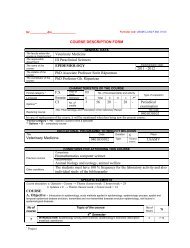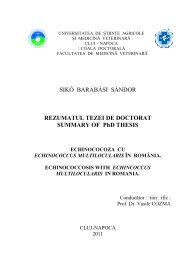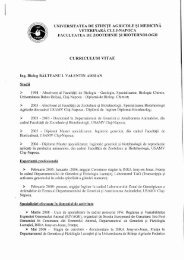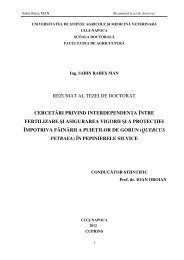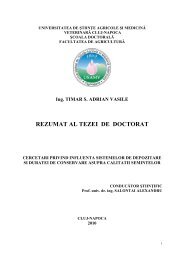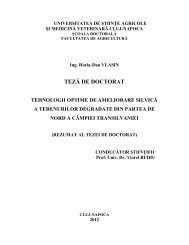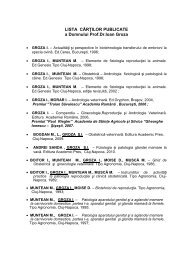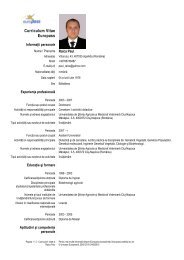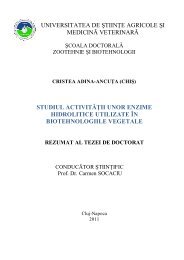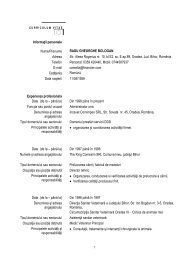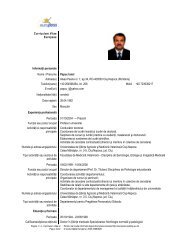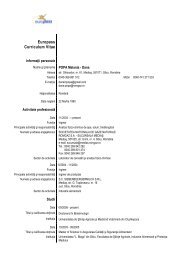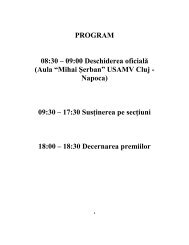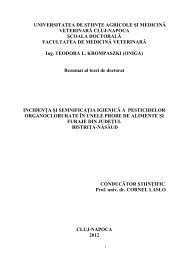self evaluation report - Universitatea de Ştiinţe Agricole şi Medicină ...
self evaluation report - Universitatea de Ştiinţe Agricole şi Medicină ...
self evaluation report - Universitatea de Ştiinţe Agricole şi Medicină ...
Create successful ePaper yourself
Turn your PDF publications into a flip-book with our unique Google optimized e-Paper software.
4. The <strong>de</strong>mographic <strong>de</strong>crease trend with a negative impact on the dynamics of the stu<strong>de</strong>nts number and the<br />
gradual increase of the cost of living, leads to a <strong>de</strong>crease of the living standards and lack of interest of high<br />
school graduates for University;<br />
5. The current economic context, with few medium-sized and large economic agents who can execute and<br />
support the placing of stu<strong>de</strong>nts in internships, which affects the training of future graduates who will not<br />
have a minimum experience in the profession gained;<br />
6. The significant reduction of national research funding during the last 3 years, concomitant with the<br />
increase of the standards for minimum eligibility criteria, for attracting research grants at national level as<br />
a project director;<br />
7. Lack of an active research market in Romania (which is inducing the <strong>de</strong>crease of doctoral and postdoctoral<br />
studies);<br />
8. Unable to promote the teaching staff based on the strong performance criteria imposed by the law,<br />
especially for young teachers;<br />
9. Payment of state employees does not allow financial incentives for the research activity;<br />
10. The downward trend of revenues from stu<strong>de</strong>nts (study fees), the high abandon rate of stu<strong>de</strong>nts in the first<br />
years of study.<br />
7. CONCLUSIONS<br />
Over the 143 years of history, USAMV Cluj-Napoca has <strong>de</strong>veloped as a major aca<strong>de</strong>mic institution, at regional<br />
and national levels. After 1990, and especially after the acceptance of Romania as EU member, major changes<br />
in the Higher Education Area were adopted and therefore, USAMV Cluj-Napoca adapted its strategy for<br />
<strong>de</strong>velopment.<br />
The Bologna and Lisbon processes supported the university didactic and research restructuring; increasing the<br />
quality and the efficiency of all the aca<strong>de</strong>mic processes is now un<strong>de</strong>rstood as a continuing action, prerequisite<br />
for international recognition and competitiveness.<br />
The university strategy is formulated for four years, and the targets set for the next years are consi<strong>de</strong>ring<br />
Excellence, Competitiveness and Societal Integration, placing USAMV Cluj-Napoca as an advanced research<br />
and education university, according to the Law of Education No. 1/2011. The requirements stated by this new<br />
law open opportunities for the university restructuring, strengthening the already existent strong points: in<br />
education, research, aca<strong>de</strong>mic community and management. Accessing the highest ranking at national level is<br />
supported by a set of results that individualize the university in Romania, and are in good agreement with the<br />
<strong>de</strong>velopments in EU universities of reference.<br />
The Integrated education (at all levels) and advanced research, giving and efficient and effective use of the<br />
existent, and <strong>de</strong>veloping resources (human, infrastructure, documentation, etc.), further <strong>de</strong>velopments,<br />
consi<strong>de</strong>ring that the teaching lines can bring significant changes in the university faculties/education/<br />
<strong>de</strong>partments structure.<br />
The integrated approach linking high-tech products’ <strong>de</strong>velopment (Sustainable Energy), environmental issues<br />
(Natural Resources Conservation and Use), Quality of Life and Education and Economic Development, gives<br />
the possibility for complex approaches in large projects, actively involving the RTD <strong>de</strong>partments. Specific<br />
structures for strengthening the role of the Institute in promoting RTD of excellence and technology transfer<br />
are now un<strong>de</strong>r consi<strong>de</strong>ration.<br />
The stu<strong>de</strong>nt facilities for learning and living open new opportunities in the next years, including a training offer<br />
for horizontal competencies (e.g. entrepreneurship, didactics).<br />
The large number of projects for human resources <strong>de</strong>velopment that are now running in the university,<br />
further support this trend and enhance the knowledge and skills of our graduates. Strong involvement in the<br />
community and economic area of the region, resulting in aca<strong>de</strong>my-industry partnerships - consi<strong>de</strong>ring in the<br />
future the <strong>de</strong>velopment of these partnerships un<strong>de</strong>r the new law of public-private partnerships.<br />
Page 24 SELF-EVALUATION REPORT, March, 2012



